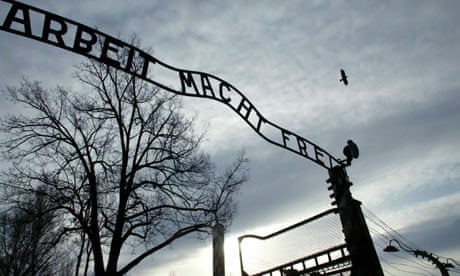A state of emergency was announced in Poland today involving tightened border controls and random police checks as a nationwide hunt was launched for the infamous bronze sign to the former German Nazi death camp Auschwitz after it was stolen.
The discovery this morning that the sign had been wrenched from the top of the entrance gate posts prompted international reactions of outrage from Washington to London and urgent calls for its return.
The sign, cast by camp prisoners, which offered the cynical welcome to new inmates "Arbeit Macht Frei" (work sets you free) and stands as a potent symbol of the suffering millions endured at the camp, is believed to have been removed by a gang in what authorities called a meticulously planned robbery.
Katarzyna Padlo, spokeswoman for police in Oświęcim, (the Polish name for Auschwitz) in south-eastern Poland, said: "We believe the sign was stolen between 3.30am and 5am when museum guards first noticed it was missing and called the police."
Scores of Polish police were put on the case to investigate the whereabouts of the sign.
Border patrol police were told to be on the lookout for the 5m-long heavy cast-iron plaque that had spanned the entrance gate, over fears that there might have been plans to take it out of the country.
The news of the sign's disappearance triggered impassioned calls for its return.
Shimon Peres, president of Israel, discussed the theft with Poland's prime minister, Donald Tusk, in Copenhagen today. "The state of Israel and the Jewish people in their entirety ask that you take the necessary steps to catch the criminals and return the sign to its place," he told Tusk. "The sign is of profound historical significance both for the Jewish people and the entire world."
Avner Shalev, president of Yad Vashem Holocaust memorial in Israel, said: "This is an attack on the remembrance of the Holocaust," referring to those responsible as "certain elements who want to take us back to the dark days".
Jaroslaw Mensfeld, a historian and spokesman for Auschwitz, called the incident "shameful" and said it amounted to the "desecration of a place in which more than a million people were murdered".
Karen Pollock, chief executive of the Holocaust Educational Trust in the UK, said she was disgusted by the robbery, which she called an "appalling act of vandalism [that showed] gross disregard to all Holocaust survivors and the families of those who lost loved ones there.
"The Nazi death camp Auschwitz-Birkenau stands as a universal symbol of the Holocaust and for millions of victims the sign represented the cynical cruelty of Nazi rule."
Poland's parliament said the recovery of the sign was being treated as a matter of urgency. "This is regretful and embarrassing," said Bogdan Borusewicz, chairman of the second parliamentary chamber of the Polish senate. "I just hope they don't destroy the plaque."
Andrzej Przewoznik, minister with responsibility for the protection of historical monuments, said: "This is an act of vandalism that knows no equal."
There was widespread speculation over who might have been behind the robbery, with investigators looking into suggestions that it could have been anyone from scrap metal dealers to Holocaust deniers, from rightwing collectors of Nazi memorabilia to pre-Christmas pranksters.
Tonight they were still no closer to solving the mystery.
Police believe a gang was responsible for the robbery because it had apparently been carefully carried out with the perpetrators avoiding attracting the attention of nightwatchmen or being caught on CCTV cameras.
They confirmed that the sign had been unscrewed on one side and pulled off with some force on the other. Sniffer dogs brought to the scene have led police to believe the sign was removed from the camp compound through a hole in the fence before being loaded into a van. After that any trail of the thieves has been lost.
Authorities in the region announced a state of emergency as the hunt for the sign was launched and a nationwide appeal went out urging anyone with any information to contact police. A 5,000 zloty (£1,000) reward was being offered to anyone with information that would lead to the criminals or the whereabouts of the sign. Police were today replaying hours of video footage from the CCTV cameras at the Auschwitz site, which is now a museum.
The Polish ambassador to Israel, Agnieszka Magdziak-Miszewska, said that it was believed the robbery had been "meticulously planned, because they were not caught on security cameras". She added: "Finding the metal sign has become a national priority."
Approximately 1.5 million people, mainly Jews, died in Auschwitz which was built in Nazi-occupied Poland. About 500 acres of the former death camp was turned into a museum after the end of the war.
The Arbeit Macht Frei sign was erected by prisoners with metalwork skills on Nazi orders in June 1940, and was a cynical take on the title of an 1873 work by the lexicographer, linguist and novelist Lorenz Diefenbach in which gamblers and fraudsters discover the path to virtue through hard work.
Museum officials have placed a replica of the sign above the gates which was used several years ago while the original was being repaired.
